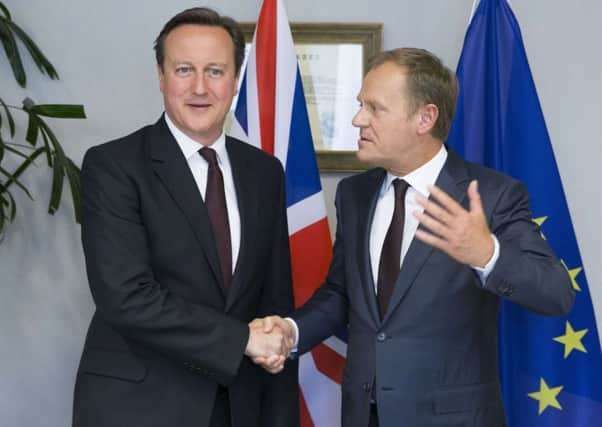Changes ‘unlikely’ by time of EU referendum vote


But they insisted the Prime Minister would secure “legally binding and irreversible” assurances that EU law will be changed to incorporate the reforms, and that they will be “crystal clear” to voters before they go to the polling booths.
The development came as a Brussels summit gave the green light to the opening of formal talks on the renegotiation in which Mr Cameron hopes to secure a package of reforms which will allow him to recommend a Yes vote to stay in the EU.
Advertisement
Hide AdAdvertisement
Hide AdThe Prime Minister said it was a “significant milestone” to have the renegotiation on the agenda at the gathering of the EU’s 28 national leaders, even though the issue was discussed only briefly in a two-day meeting dominated by Greek debt and the Mediterranean migrant crisis.
In individual talks with the other 27 leaders, Mr Cameron made clear he believes treaty change will be needed to deal with issues including EU migration into the UK, a British opt-out from the goal of “ever-closer union” in Europe, greater powers for national parliaments and protections for countries that are not members of the euro.
In bilateral talks after arriving in Brussels, the Prime Minister secured agreement from European Council president Donald Tusk that talks should begin between British and EU officials on the substance of changes Britain is demanding.
A leaked draft of the communiqué expected to be agreed by the European Council tomorrow indicated these “technical” talks on Mr Cameron’s proposals will take at least six months, before the leaders discuss them again at a summit in December.
British officials acknowledged a final decision on the shape of the reform package may not be agreed even then, saying the talks would be driven by the substance of the discussions rather than an “arbitrary” timetable.
They insisted there was no change in Mr Cameron’s position on the timing of treaty changes, and that the UK had always assumed they would not be in place by the time of the referendum, because of the lengthy process of ratifying them in national parliaments across the EU.
“There will be a process that will be needed to bring changes into force, but we will get agreement on the treaty change before the referendum. Will it be crystal clear and binding at the point it goes to the British people? Yes,” one official said.
There was also an attempt to play down concerns that any agreed reforms may be blocked by referendums in other EU nations, such as Ireland, which has a convention that treaty changes are subject to a public vote.
Advertisement
Hide AdAdvertisement
Hide AdHowever, there were signs in Brussels of the resistance Mr Cameron will face in his drive to reshape the UK’s relationship with the EU. Mr Tusk said he was happy to discuss Britain’s concerns but warned: “One thing should be clear from the very beginning – the fundamental values of the EU are not for sale and so are non-negotiable.”
European Parliament president Martin Schulz said: “Solutions in the EU usually are not brought about by one member state making demands and expecting the others to deliver.”
Mr Schulz warned the process could take up to four years and said Mr Cameron, in his discussions with fellow EU leaders, will have come to the realisation that “treaty change doesn’t go without saying, that there is quite some resistance to changing the treaties”.
He suggested Mr Cameron’s chances of success might depend on who he was seeking to win over. “Who is the audience of the Prime Minister?” Mr Schulz said. “If it is the Tory group in the parliament, I think we are facing a lot of problems. If it is the British people to convince, then you can present successes you can achieve here also as a success to win the majority of the people.”
European Commission president Jean Claude Juncker appeared unsure of what reforms Mr Cameron was seeking, asking reporters: “What does he want?”
The changes to welfare entitlements of EU migrants sought by the Prime Minister were “a matter for national lawmakers”, he said.
Asked about a formal British opt-out on closer union, Belgian finance minister Johan Van Overtveldt said: “That kind of statement and that kind of policy line would of course make negotiations, to say the least, not easy.”
Austrian chancellor Werner Faymann said he “fully agrees” with French economy minister Emmanuel Macron who said EU member states should not be able to pick and choose “a la carte” which aspects of the EU they liked.
Advertisement
Hide AdAdvertisement
Hide AdThe summit came a day after the Queen highlighted the need for European unity in a speech during her state visit to Germany. Speaking at a banquet in Berlin attended by Mr Cameron and German chancellor Angela Merkel, the Queen said it was necessary to “work hard to maintain the benefits of the post-war world”, adding: “We know that division in Europe is dangerous and that we must guard against it in the west as well as in the east of our continent.”
Asked whether the Queen took advice from Downing Street in the usual way about the content of her speech, the Prime Minister’s spokeswoman said: “You would expect us to follow the normal process as we would for speeches made by the Queen at banquets around the world.”